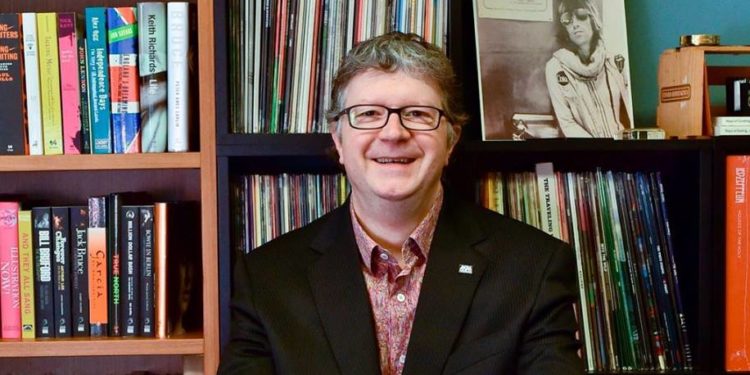Scott Booker is nothing short of an expert in the music industry, but he doesn’t claim to know everything. We sat down with Booker in his office at ACM@UCO to chat about his history in music and gather his thoughts on music business.
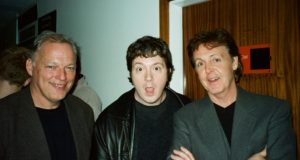
Walking into Booker’s office is like walking into a museum exhibit of music history. Hanging on the exposed brick wall is a photo of Neil Young’s record collection, a photo Booker took while in Young’s home.
There are also hundreds of records organized in a cabinet as well as several books about music, framed and autographed records, a harpsichord, a piano, and several hanging guitars.
Booker begins the interview by joking about his abundance of items, saying that he has a hesitancy to toss anything out, because, ultimately, every record means something to him.
This sets the tone for Booker’s passion for music, as he talks at length about his own experiences and his philosophies surrounding music.
Making it in Music
Booker gestures to a framed bookbag, which reads “GRIT America’s Family Newspaper.” He explains that this was his first job – selling newspapers.
“At the end of the week, I made five bucks, which was enough to buy an album,” Booker said.
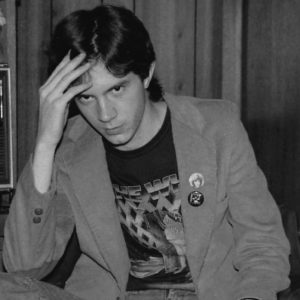
He calls the job his first introduction into the entertainment business, and his perspective on the pay-off hasn’t changed. To Booker, the meaning of success revolves around buying records.
“My goal in life is to keep buying records, and as long as I can keep buying records, then things are pretty good,” Booker said. “And I get to buy a lot of records, so things are good.”
His second job, at fifteen, was as a clerk at Sound Warehouse in Midwest City in 1981. In college, he started working at Rainbow Records in Oklahoma City and began promoting concerts in the area. He said he learned a lot about the music industry during this time.
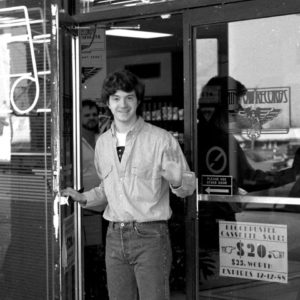
Booker soon began working with Oklahoma band the Flaming Lips. The band gained traction, and to this day, Booker manages the three-time Grammy award-winning band.
“I met the Flaming Lips through the record store,” Booker said. “They shopped there, and we became friends, and I started doing these shows, and they saw that I was honest and that I really tried to make things work.”
For the first few years that the Flaming Lips were signed to Warner Brothers, Booker and the band members still worked day jobs on the off-chance things didn’t work out. Flaming Lips lead singer Wayne Coyne famously worked at Long John Silvers. Booker said this is a philosophy that still sticks with him.
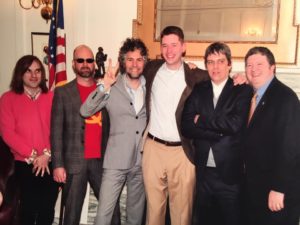
“There is this thing in the back of my head, that at any moment this could all go belly-up,” he said. “I have to be prepared in case of that.”
Booker said the start of his career came with some failures, as does every career. He managed to book Nirvana in the early days, but, unfortunately the band didn’t show up, which resulted in Booker losing his life savings (which, at that time, he said, was around $500).
During the conversation, Booker picked up a record from his shelf – the debut album from local musician John Calvin Abney. This led into a conversation about ‘90s alternative artist Elliott Smith, a musician Abney has been compared to several times and has cited as an influence.
Booker worked with Smith when Smith left his record label due to drug concerns. Smith was later found dead in 2003. His death has been the subject of many conspiracy theories and in-depth analyses.
“The coroner called me, and the first thing he asked was ‘where were you on this day?’” Booker said. “It was kind of weird to think, for a brief moment I was suspected of possibly murdering Elliott Smith.”
Reflecting on Growth
Booker has lived in Oklahoma all his life, and he says the state is improving in its music culture, but there’s still a long way to go. There’s no reason, he says, why Oklahoma City can’t be the next Nashville or Austin.
“I think we’re definitely on this path of taking it back,” Booker said.

ACM@UCO opened its doors in the fall of 2009, with Booker as the CEO, bringing in guests like Roger Daltrey from the Who and Ben Folds.
Since the opening of the school, a lot has changed in the music scene. Ten years ago, there was no Tower Theatre, Criterion, or Jones Assembly.
“I’m not saying we’re the cause of it, but we certainly were a catalyst for there to be even a dynamic change in the way people digest live music,” Booker said.
Booker, 52 years of age, has been in the music industry for 37 years. Some days, he said, it’s the greatest thing in the world. Other days, it’s soul-crushing, but he continues to pursue the career because of his passion for music.
“I just love music,” Booker said. “I should be a jaded old guy who’s sick of the music industry, but I love this. I started a school because I want more musicians to exist.”
Thoughts on the Industry
People are geared to like sugar, so life in the sweets industry is pretty reliable. The problem, Booker says, is that art isn’t like sugar. It’s subjective. And what one person loves, another person may hate, so that’s why it’s important to identify an audience and learn how to market one’s art.
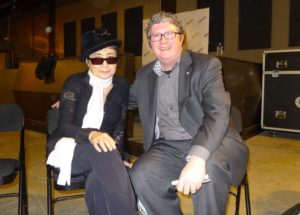
“Someone just liking what you do isn’t enough,” he said. “That’s part of why I started the school.”
Booker said a lot of musicians approach him thinking that people will like them if they’re a good musician. He also said many bands end up breaking up because they’re not willing to put in the work. This, to Booker, is a problem, and it’s a big part of what he wants to teach budding artists.
“You can be passionate about the artists you work with or the art you make, but you always want to be pragmatic and realistic as to what can happen with it,” he said.
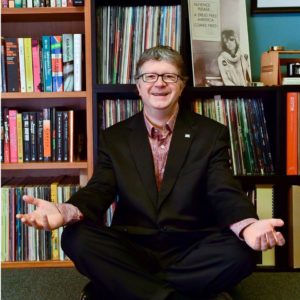
The idea that people just get successful overnight isn’t as common as it may seem, Booker said. Instead, much of the music industry is learning how to be patient and connect with others.
“I’ve never believed that this was a competitive business,” Booker said. “I’ve always believed the exact opposite – that the more we connect, the stronger it gets.”
To Booker, life in the music industry isn’t about fame or prowess. It’s about bringing art into the world and buying records.
“To get involved in the music industry as a whole, you don’t want to do it because you think you’re going to be rich and famous,” he said. “You have to do it because you don’t have any other choice. It’s just part of you.”


